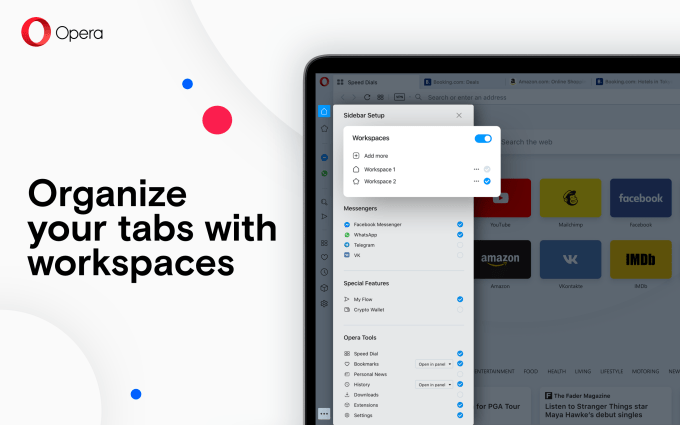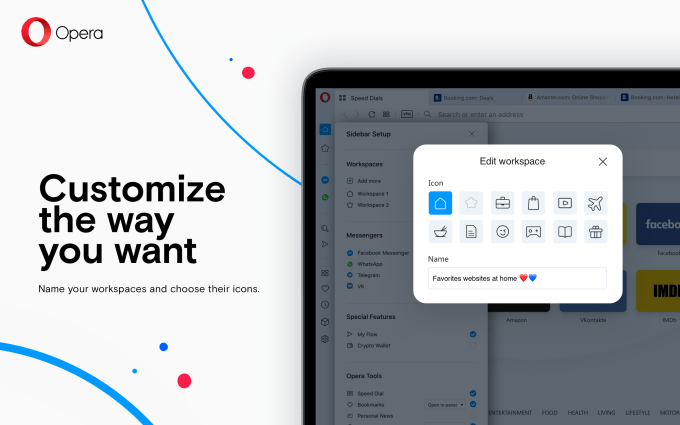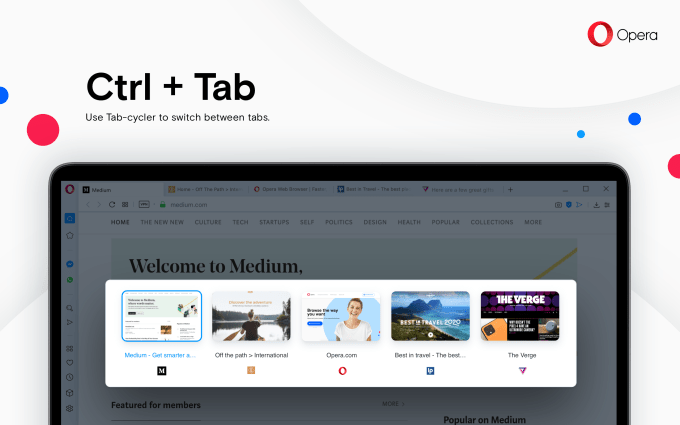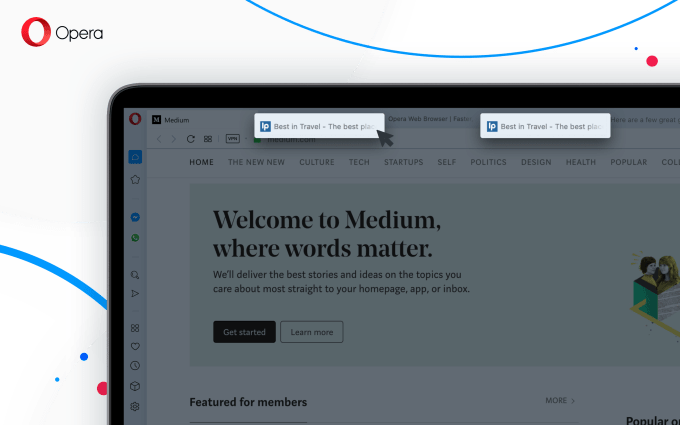A new web browser from Opera launching today aims to help users get their chaotic mess of open tabs back under control. In the latest release of Opera’s desktop browser (codenamed R2020), the company is introducing a new feature called “Workspaces” that allows you to organize your tabs based on different contexts — for example, workspaces for work, free time activities, personal projects, research, travel planning and more.
Today, it’s common for web users to keep open dozens of tabs — and even multiple separate windows, each filled with tabs — as an attempt to keep their web searches and research somewhat organized. This is particularly tough for knowledge workers who spend their days working from a PC or for the 66% of Americans who use the same browser for work and personal browsing, Opera says.
Opera’s study also found that 65% of people want to keep their browser more organized and 60% wanted to be able to group tabs.

Unfortunately, major browser makers have still not effectively addressed these problems, instead leaving users to design their own productivity solutions or to turn to third-party browser add-ons for help with organization.
For example, the browser extension OneTab lets you quickly close and save all your open tabs for later access. However, because extensions like this aren’t part of the core browser experience, many users don’t know they exist. And even if you do use an extension to aid with organization, it’s easy to forget you’ve saved your tabs somewhere — often, you’ll just search up the same pages again instead of restoring them.
Opera’s system instead presents the concept of the workspace as a means of taming your numerous open tabs. You can create up to five workspaces in the new browser, name them and designate their icons. The icons are accessible from the top of the sidebar, with the currently active workspace highlighted in blue.
You can also right-click any link to open it in a different workspace and move tabs between workspaces easily, the company says. That can help users not just start off organized but stay organized, especially since people tend to switch back and forth between contexts as they work. For example, users may take a few minutes to check on personal messages and social networks in between typing into online spreadsheets and responding to work emails.

“Opera invented browser tabs, and today we know that people need more support from their browser interface to handle them,” said Joanna Czajka, product director, Opera for PC, in a statement about the launch. “Everybody wants their environment to be more tidy, ideally without having to clean. Workspaces let you get organized from the first moment you use them, without you having to learn how to use a new tool.”
While Workspaces is the major new feature in the beta browser, another addition lets you switch between open tabs easily by using the keyboard shortcut Ctrl + Tab — similar to switching applications on macOS. And a third new tool will highlight if you have any duplicate open tabs when you hover over a tab with your mouse pointer.

Opera is well-known for its browser innovations, but many of its latest releases have been more focused on technology integrations, like the built-in cryptocurrency wallet or VPN. It has also released tools designed to protect privacy, like the tracker blocker, and debuted a browser for gamers, Opera GX. But it hasn’t been as focused on the day-to-day needs of browser users as of late.

Unfortunately, switching browsers can be more difficult these days since smaller browsers and beta builds don’t always support the variety of extensions users rely on.
Nevertheless, Opera claims its browser user base is growing. Its PC browser user base grew 17% from Q3 2018 to Q3 2019, the company says, reaching now more than 68 million monthly users.
The browser is a free download here.
from TechCrunch https://ift.tt/3c7DIXr
via IFTTT
Comments
Post a Comment